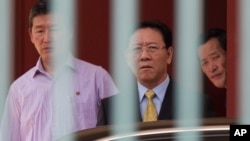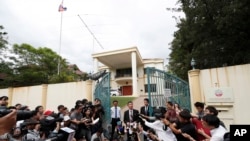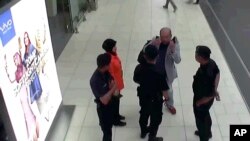Malaysia's openness with an abundance of countries seems to be a source of pride for locals. But since North Korea's alleged assassination of Kim Jong Nam on Malaysian soil, many believe Pyongyang has stretched the limits of kindness.
"You could say that we just didn't quite measure the risks, the potential cost of this," said Shahriman Lockman, a senior analyst at the Institute for International and Strategic Studies Malaysia.
"This was a relationship where the North Koreans were in the driver's seat for a long, long time."
In the latest diplomatic fallout from the shocking death of Kim Jong Nam - Kim Jong Un's older half brother - Malaysia called North Korean Ambassador Kang Chol "rude" and designated him "persona non grata," telling him to leave the country by Monday.
Not really friends
Malaysia and North Korea opened embassies in their capitals in 2003. But the trade balance is tipped heavily in favor of North Korea.
"This relationship was mostly about North Korea taking advantage of a space that Malaysia provided," said Lockman. "From North Korea's perspective, they benefited from benign neglect on our part."
To do business, that is, and gain hard currency, sometimes illegally. Last week, Reuters ran an in-depth story about North Korea selling battlefield radios from a front company in Kuala Lumpur's Little India.
To stress how little North Korea means to Malaysia economically, Lockman said multinational companies, such as Samsung, are vastly more important to Malaysia than the whole of North Korea.
Time to wise up
Deva Rajaratnam is a civil engineer in Kuala Lumpur. Lately, he said, he's been off the job and driving for Uber because of a health issue.
Rajaratnam makes the occasional airport run, but said he's not concerned about his safety following the attack on Kim Jong Nam at Kuala Lumpur International Airport. He said Malaysians on average aren't either.
What worries Rajaratnam the most is the way the attack was carried out. It must have taken a lot of planning and skill, he said, to train unsuspecting foreign women to carry out the hit. And preparations took place right under the nose of the Malaysian government.
"It's a big issue because we really don't have international crime in Malaysia. We are a democratic country, and we should wise up," said Rajaratnam.
He's uncertain whether severing diplomatic ties with North Korea would solve what he perceives to be lax government oversight.
Lockman said he doesn't foresee the government breaking off ties. In his opinion, it would set a negative precedent for future incidents with countries that are indispensable to Malaysia.
"People will say, well, you did that with North Korea. Why aren't you doing it with this country? Consistency is overrated, but we try to have some level of consistency in these sort of matters."
Ready to move on
The human rights group Suaram, one of the largest in the country, recently held an office warming party at its new location in the Kuala Lumpur suburb of Petaling Jaya, or PJ as it's known by locals.
Members of the punk band Dum Dum Tak performed an acoustic set and sang about Prime Minister Najib Razak's 1MDB corruption scandal. Several people at the party mentioned rising gas prices and how the attack at the airport distracts from the failures of the Najib government.
"Economic, human rights issues. We had a pastor who was kidnapped in broad daylight… news of that was completely under the radar," said Chew Chuan Yang, a project coordinator with Suaram.
He's referring to the abduction of pastor Raymond Koh Keng Joo, who according to The Star, was abducted with "military-like precision" the same day as Kim Jong Nam's killing.
"Call me cynical or a conspiracy theorist, but it does feel like the mainstream media and the government are using this [assassination] to keep other things quiet."
Further fallout
Malaysia announced it's canceling its visa-free agreement with North Korea, though that will only impact North Koreans seeking to enter the country for 30 days.
According to Sung Wuk Ahn, a professor of international relations at the University of Malaya, there are around 1,000 North Koreans, including coal miners, working on special visas in Malaysia.
"[The canceling of the deal] will make it much harder for them to work here," he said.
University of Malaya senior lecturer Geetha Govindasamy told The Star newspaper the new visa requirements are unlikely to impact North Korea's economy. She added, however, that they could make it harder for North Korea to profit from illegal activity.






